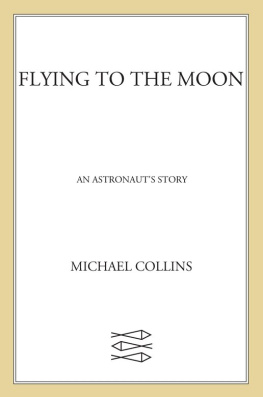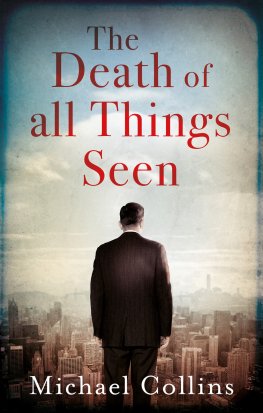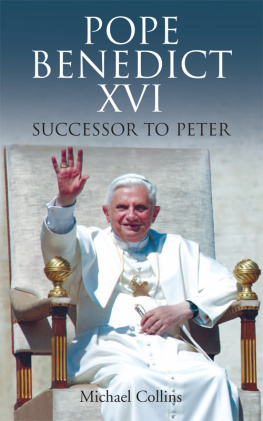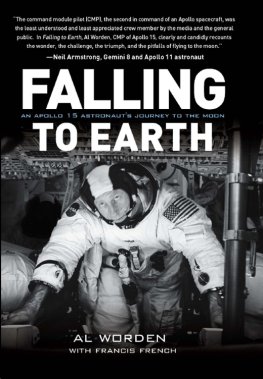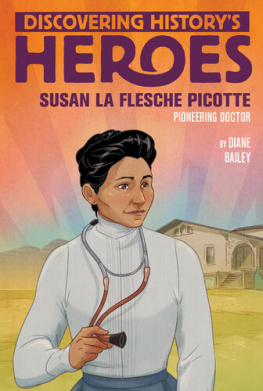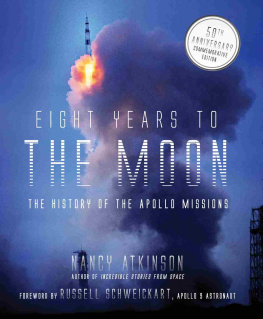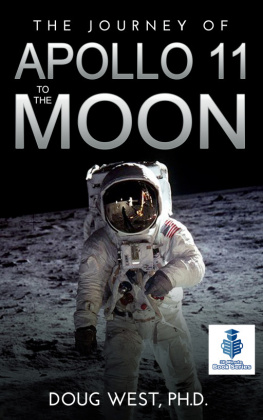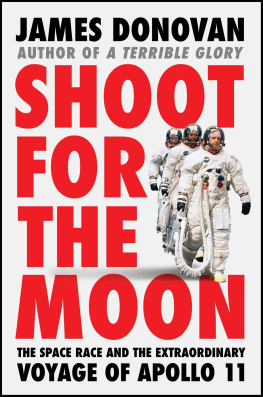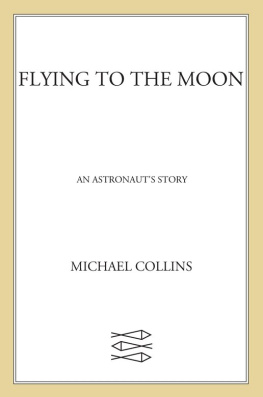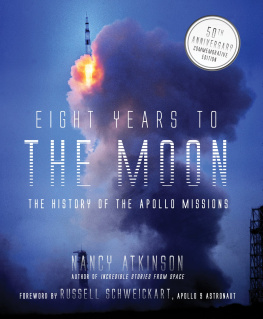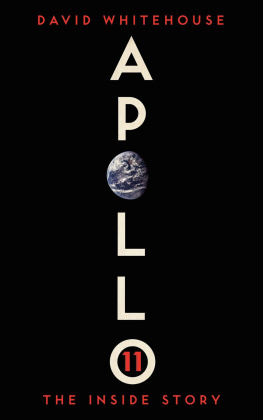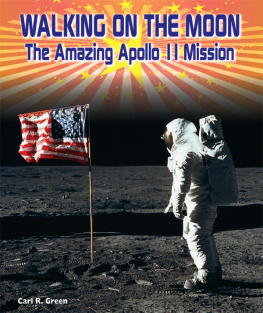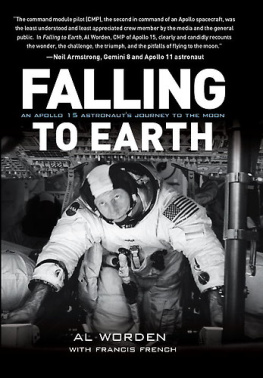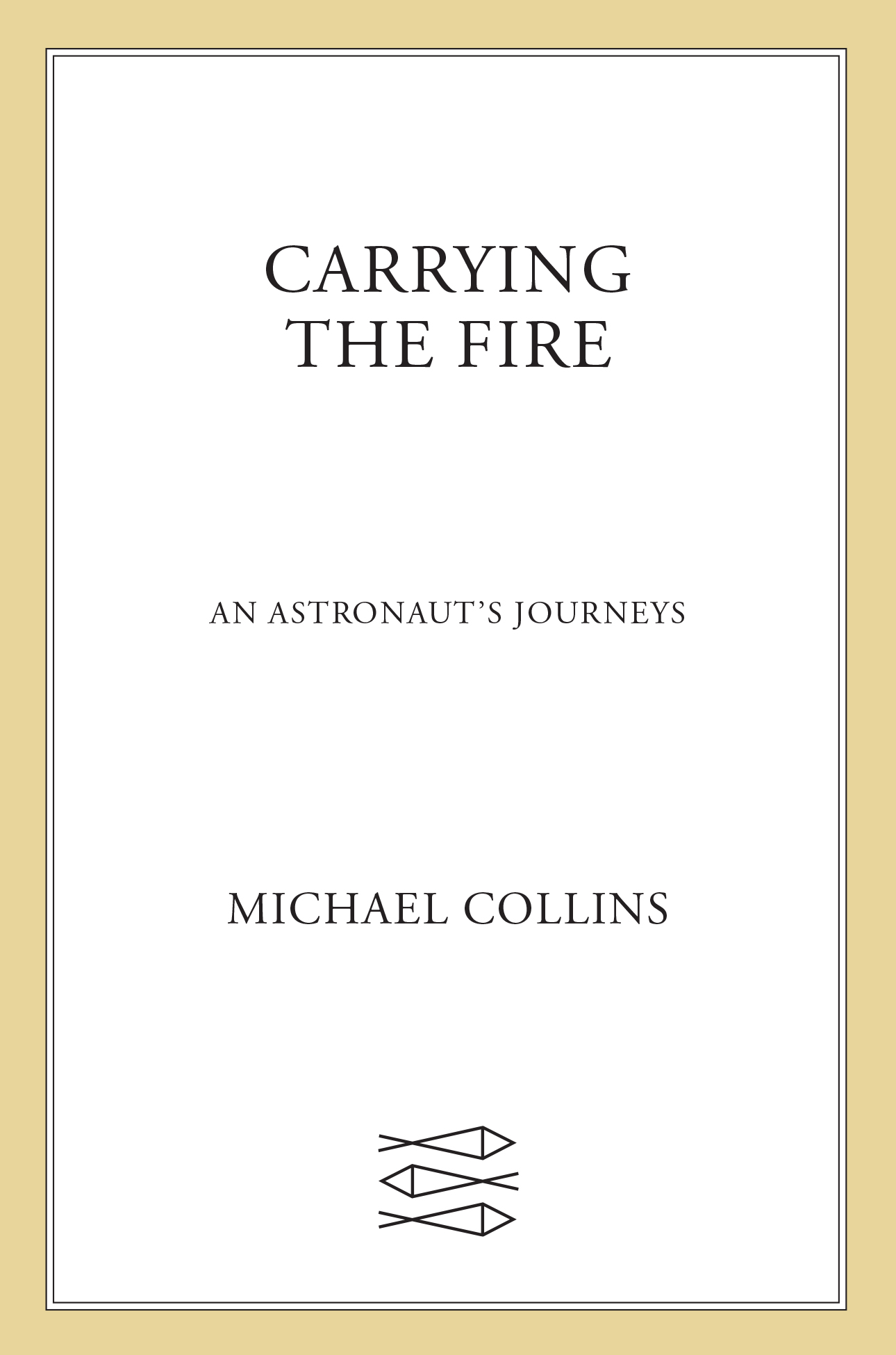The author and publisher have provided this e-book to you for your personal use only. You may not make this e-book publicly available in any way. Copyright infringement is against the law. If you believe the copy of this e-book you are reading infringes on the authors copyright, please notify the publisher at: us.macmillanusa.com/piracy.
I would like to thank Ferdinand E. Ruge, Master of English at St. Albans School in Washington, who taught me to write a sentence; Roger Straus III, my amiable and supportive editor; and Terry Pietroski, who ruined many of her weekends converting my chicken scratchings into neat pages of type.
Charles A. Lindbergh
Perceptive, clear, and comprehensive, targeted on lifes first expedition to the moons surface, this book combines a contemplative mind and poets eye with the essentially practical approach of a participating astronaut. Here is a fascinating autobiographical account of one of civilizations greatest accomplishments and one of mans greatest adventures. It will be read and reread as long as records last.
In these chapters, the human and technical interweave to give an extraordinary sense of NASA, its astronauts and spatial ventures. You realize the almost infinite problems involved in operating spacecraft, the intricate organization and training required to solve them, the ambitions, the frustrations, the hazards, duties, and relationships of a successful astronauts career. It is easy to so identify with the story that you become an astronaut yourself.
Reading Michael Collinss manuscript of Carrying the Fire took me back in memory to my first meeting with Robert Goddard, the father of space flight. On the porch of his home at Worcester, Massachusetts, in 1929, I listened to Goddard talk about his liquid rockets and his dreams of spatial exploration. He felt quite certain, he told me, that he would be able to build a rocket capable of carrying scientific instruments to altitudes approaching one hundred miles; and that from these altitudes, above atmospheric interference, valuable observations could be made. He thought it would even be possible to build a multistage rocket that could reach the moon; but it might cost a million dollars, he added, with an air of dismissing the idea from consideration.
At that time, none of Goddards rockets had reached an altitude of one mile, to say nothing of one hundred. His estimated budget for a years experimental work was $25,000, including laboratory, launching tower, equipment, salaries, and transportation. Now I was reading about an accomplished voyage to the moon, and the United States was spending millions of dollars every day on the development of rockets.
Carrying the Fire roots into Goddards pioneering work, and branches in modern technologys accomplishments. You must have witnessed an Apollo ascent to know the titles aptness. When a countdown at Cape Canaveral touches zero, you think the giant rocket will be consumed by bursting clouds of flame and thunder. Where I stood with astronauts three miles away from Apollo 11s pad, my chest was beaten and the ground shook as though bombs were falling nearby. Then a flame arose, left the ground behindhigherfastera meteor streaking through the sky. It seemed impossible for life to exist while carrying that ball of fire. Yet it did exist, as I saw later on a television screen that portrayed weightless men, countless instruments, and planet earth through a window.
The miracle of television kept me in contact with the Apollo 11 expedition until images formed by cameras a quarter million miles away showed life walking on a previously lifeless moon: pressure-suited, tank-headed beings, cleated footprints, a vehicle in the background as startling as an artists weirdest concept of a flying saucer.
How isolated, how lonely those two space supermen appeared! But they had each other for companionship; and through television, they were held in the thoughts of viewing millions of men and women. To be really isolated, to fully experience loneliness, you must be alone. From Armstrongs and Aldrins spectacular movements, my mind shifted to Collinss lunar orbiting. Relatively inactive and unwatched, he had time for contemplation, time to study both the nearby surface of the moon and the distant moonlike world. Here was human awareness floating through universal reaches, attached to our earth by such tenuous bonds as radio waves and star sights. A minor functional error would leave it floating forever in the space from which, ancestrally, it came.
Only once before had I felt such extension as when I thought of Astronaut Collins. That was over the Atlantic Ocean on my nonstop flight with the Spirit of St. Louis. I had been without sleep for more than two days and two nights, and my awareness seemed to be abandoning my body to expand on stellar scales. There were moments when I seemed so disconnected from the world, my plane, my mind and heartbeat that they were completely unessential to my new existence.
Experiences of that flight combined with those of ensuing life have caused me to value all human accomplishments by their effect on the intangible quality we name awareness. Scientific and technological developments have had great effect on our awareness, as the accounts of astronomers, nuclear physicists, aviators, and astronauts have shown, and as Carrying the Fire verifies.
After evolutionary epochs, life in the human species became aware of its awareness. Then in a comparatively short period of time, using such devices as lenses and spacecraft for assistance, man has extended his awareness outwardly through the universe and inwardly through the atom. But the assistance we receive from technological devices is countered by restrictions that they place upon us, and the same scientific knowledge that constructs our spacecraft informs us of apparently unsurmountable physical limits. We find the speed of light and the vastness of space to be incompatible with biological time. We begin to realize that a point arrives after which the distraction and destruction caused by technological enterprise reduce mans awareness. We become apprehensive of the direction in which our twentieth-century heading leads. Is it toward an affluent and spiritual utopia or a bleak dead end? Possibly we can judge best from outer areas of our technological penetrations.
As Collins takes us to the periphery of mans penetration into space, he also takes us to the periphery of human evolution. From momentary spatial limits, we look back on ourselves with new perspective. We see life compressed on a shrunken orb at the same time we feel awareness expanded to fantastically great dimensions. Can we harmonize the two? What does the future hold for man?
Again I return through a half century of time. When my interest in rockets began, I was faced with a similar question. Alone in my survey plane, in 1928, flying over the transcontinental air route between New York and Los Angeles, I had hours for contemplation. Aviations success was certain, with faster, bigger, and more efficient aircraft coming. But what lay beyond our conquest of the air? What did the future hold? There seemed to be nothing but space. Man had used hulls to travel over water, wheels to travel over land, wings to travel through air. Was it now remotely possible that he could use rockets to travel through space?




